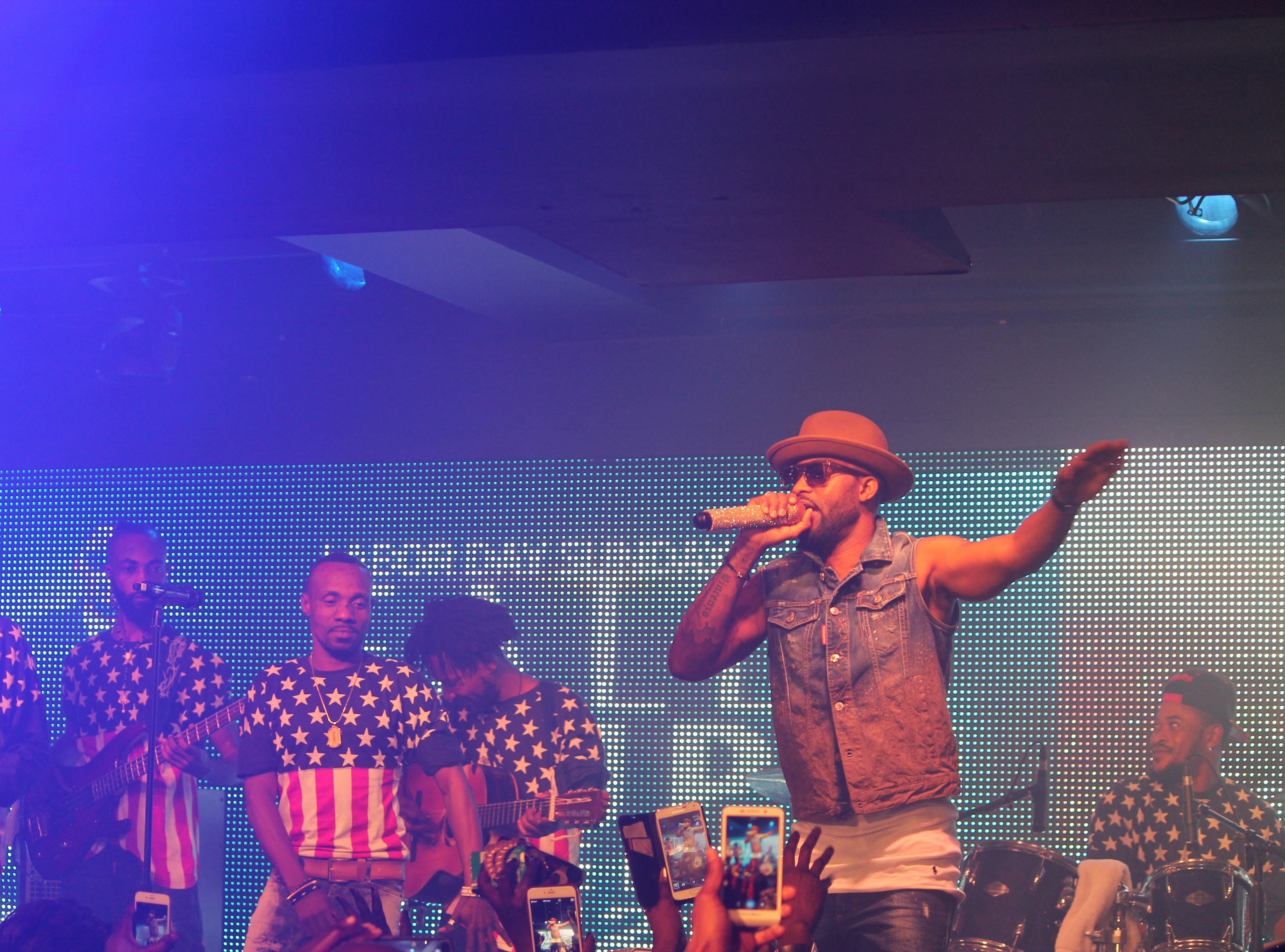Blog September 9, 2015
Fally Ipupa and Serge Beynaud: Late Night Labor Day Delight
"Do you know what time it is?" shouted the sharply dressed MC in French. "It's 7 p.m.! It will be 7:30 soon and the show will start!" The crowd erupted with laughter and jeers. It was midnight on Sept. 7, Labor Day, and the 42 West nightclub was packed for Congolese rumba star Fally Ipupa's first NYC appearance, with Ivorian coupé decalé singer Serge Beynaud. "They are here! They are about to take the stage! Be patient!"
Experience had taught me that arriving at the listed door time of 7 p.m. would be a near-fatal mistake, but even showing up a leisurely three hours later proved too early. By midnight, the large crowd was getting restless, tired of dancing to the eclectic selections of DJs Saddam Hussein (yes, that is his moniker), and Birane (over the course of the warmup period, they played everything from "Waka Waka" to "Bitch Better Have My Money" to Alpha Blondy and Fuse ODG). The ladies in heels and tight dresses retreated from the dance floor from time to time to lean against walls of the club, conserving their feet for the dancing to come. Most of the men were dressed in Western designer brands, some with baseball caps, and some wearing interesting floppy hats or fedoras. A few were dressed in old-school suits and Congolese sapeur fashion with leopard-print hats.
The MC shouted, "Is Niger in the house?" "hmm..." "Ghana in the house?!" "Yeah!" "Cote D'Ivoire in the house?" "YEAH!!!" "Congo in the house" "YEAHHH!!!!"
"Get ready....the first artist to take the stage...is beautiful boy...A singer, a dancer, an arranger..." The crowd chanted, "BEYNAUD, BEYNAUD, BEYNAUD!"
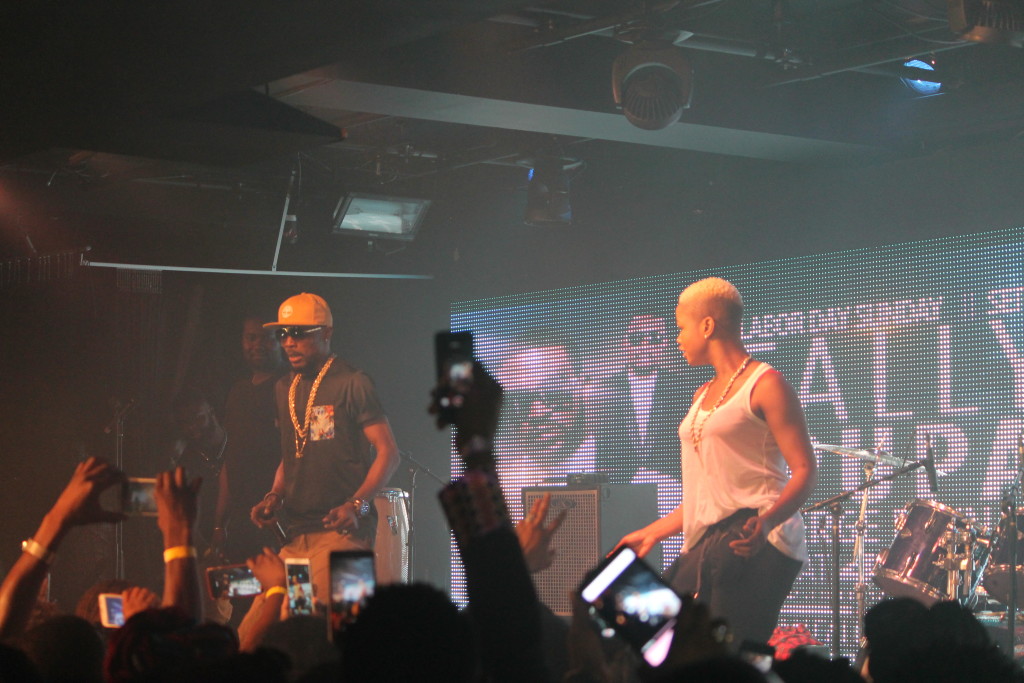 Suddenly he was on stage, striding out amidst a burst of light from the screens and a wilder burst of sound from the speakers. He was followed by his famous dancer Zota, dressed in a white tank-top and loose gym pants with close-cropped blonde hair and a gold chain around her neck. The backing tracks blared through the speakers, distorting with the extreme volumes. It was immediately clear why Beynaud brought Zota to perform with him. She danced with the focus and intention of an boxer, eyes fixed straight ahead, legs working non-stop, upper body dipping and dodging.
Suddenly he was on stage, striding out amidst a burst of light from the screens and a wilder burst of sound from the speakers. He was followed by his famous dancer Zota, dressed in a white tank-top and loose gym pants with close-cropped blonde hair and a gold chain around her neck. The backing tracks blared through the speakers, distorting with the extreme volumes. It was immediately clear why Beynaud brought Zota to perform with him. She danced with the focus and intention of an boxer, eyes fixed straight ahead, legs working non-stop, upper body dipping and dodging.
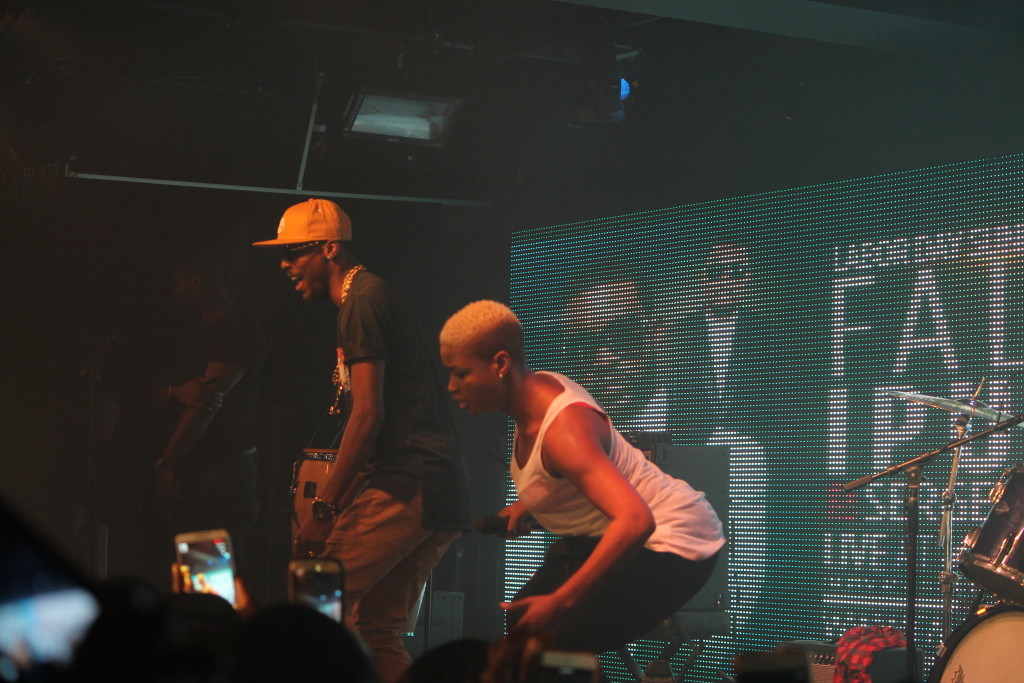 Beynaud sang along to the hyper coupé decalé tracks, eyes hidden behind shades, gold chain swinging from his neck.
Beynaud sang along to the hyper coupé decalé tracks, eyes hidden behind shades, gold chain swinging from his neck.
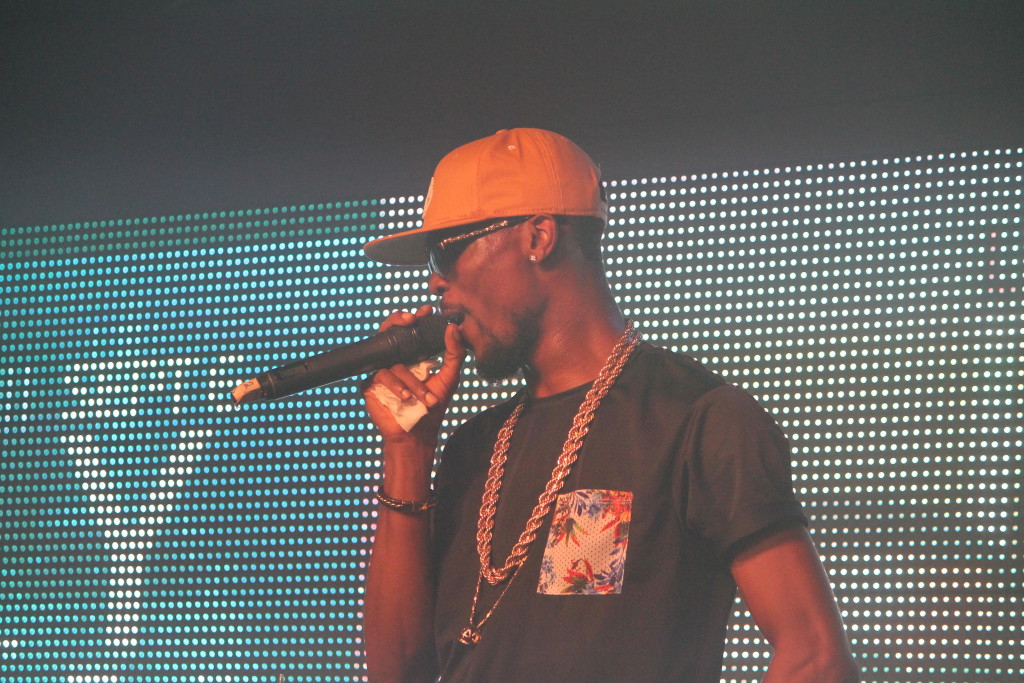 The crowd sang along to his hit, "Kababléké," snapping videos and photos with their phones. When he danced, he easily matched Zota in energy and attack, but gave her the credit. "Who loves Zota?!" The crowd screamed.
The crowd sang along to his hit, "Kababléké," snapping videos and photos with their phones. When he danced, he easily matched Zota in energy and attack, but gave her the credit. "Who loves Zota?!" The crowd screamed.
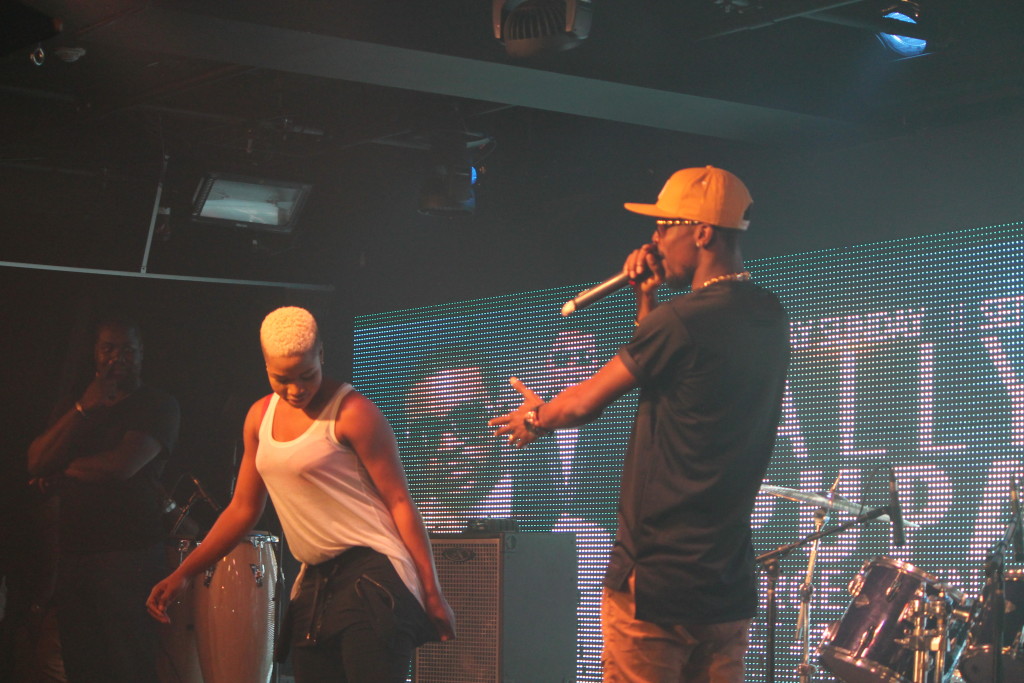 After a quick fiery set, Beynaud and Zota left the stage. The tension mounted...
"Ladies and gentlemen, Africans! C'est parti! Give them a round of applause!" The moment we had all been waiting for arrived: 10 men took the stage, dressed in identical American flag T-shirts. They quickly set levels on amps, and settled behind drum set and congas. The crowd screamed as the band kicked into unison hits. The crowd screamed even louder as the four backup singers approached the mic to sing the chorus of a slow rumba. The crowd let out a deafening roar as the star himself, Fally Ipupa, strode onstage in a denim vest, hat and sunglasses, holding a gold-plated microphone and began to sing in sweet tones through the distorted sound system.
After a quick fiery set, Beynaud and Zota left the stage. The tension mounted...
"Ladies and gentlemen, Africans! C'est parti! Give them a round of applause!" The moment we had all been waiting for arrived: 10 men took the stage, dressed in identical American flag T-shirts. They quickly set levels on amps, and settled behind drum set and congas. The crowd screamed as the band kicked into unison hits. The crowd screamed even louder as the four backup singers approached the mic to sing the chorus of a slow rumba. The crowd let out a deafening roar as the star himself, Fally Ipupa, strode onstage in a denim vest, hat and sunglasses, holding a gold-plated microphone and began to sing in sweet tones through the distorted sound system.
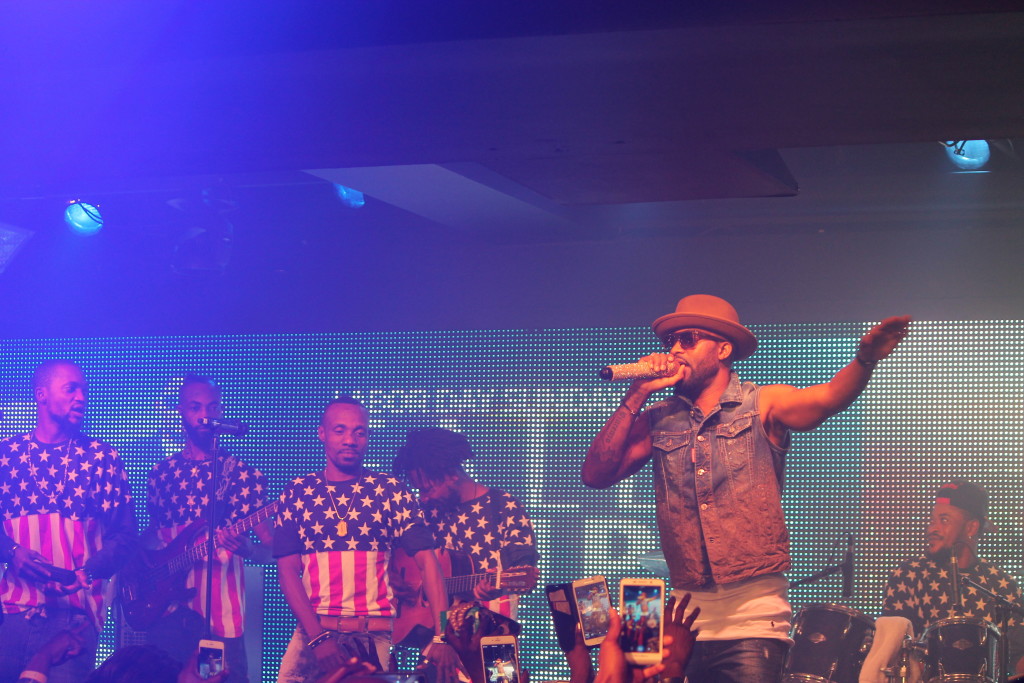 The high-pitched feedback whistled across the stage as the soundman struggled to balance all the wireless mics pushed to maximum volume. The volume and distortion made the experience more extreme: The packed dance floor was surrounded by walls of sound pushing from surrounding speakers; the floor felt like a boxing ring, and we were being beaten into sweet submission by a very worthy opponent.
The high-pitched feedback whistled across the stage as the soundman struggled to balance all the wireless mics pushed to maximum volume. The volume and distortion made the experience more extreme: The packed dance floor was surrounded by walls of sound pushing from surrounding speakers; the floor felt like a boxing ring, and we were being beaten into sweet submission by a very worthy opponent.
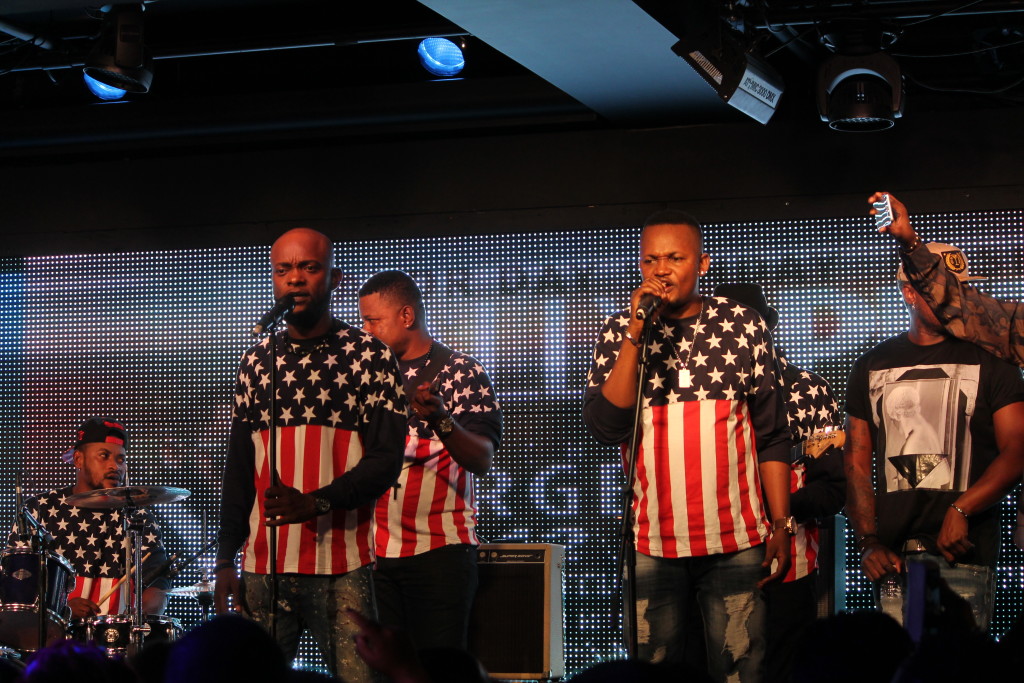 The band tore through tight, aggressive grooves, quickly switching rhythms, dropping from a fast 6/8 to a chill rumba, then launching into a waist-twisting ndombolo. When the first seben dance section hit, the three guitars emerged from the mix, each swaggering in their own register, and the drummer and bassist pushed the exciting feeling forward. The singer on the far left, the atalaku or animateur, began to shout/sing as the other singers danced together, turned lightly, arms raised.
The band tore through tight, aggressive grooves, quickly switching rhythms, dropping from a fast 6/8 to a chill rumba, then launching into a waist-twisting ndombolo. When the first seben dance section hit, the three guitars emerged from the mix, each swaggering in their own register, and the drummer and bassist pushed the exciting feeling forward. The singer on the far left, the atalaku or animateur, began to shout/sing as the other singers danced together, turned lightly, arms raised.
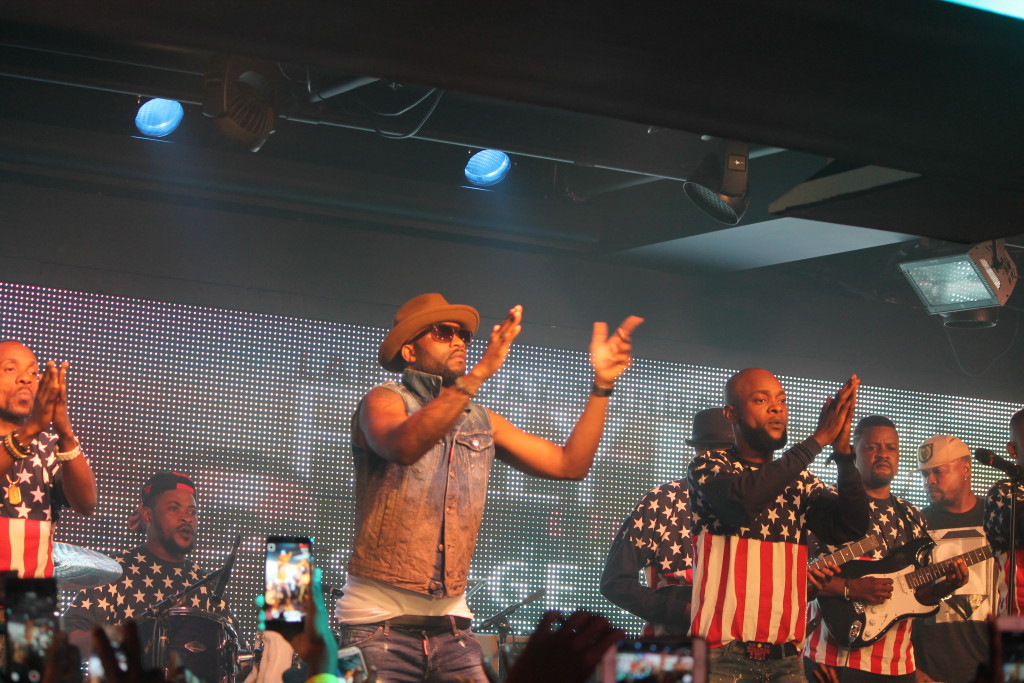 When Fally sang his hit slow-jam r&b rumba "Sweet Life (La Vie Est Belle)," he took off his vest (greeted by screams of delight) and invited four very excited young women to join him on stage as he crooned in English, French and Lingala.
When Fally sang his hit slow-jam r&b rumba "Sweet Life (La Vie Est Belle)," he took off his vest (greeted by screams of delight) and invited four very excited young women to join him on stage as he crooned in English, French and Lingala.
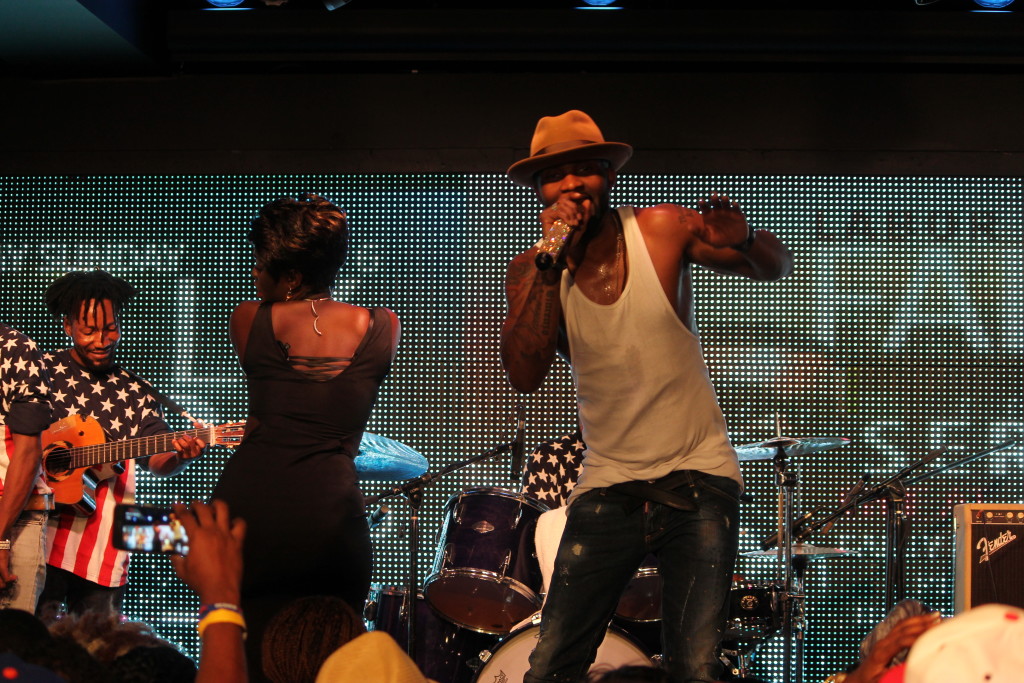 The winning formula was clear: a chill, sexy rumba was immediately followed with a crushing, tight dance tune, then, after 10 joyful minutes of serious, heavy music and dance, they played another rumba as a palate cleanser. Fally and his band crushed us into joyful submission again and again as the night waned into early morning of Labor Day Monday. Dance circles of young men and women formed in the back of the hall. The band played a destructive, aggressive version of the 2014 hit, "Hustler Is Back," which transitioned into a long seben with dance solos for all the backup singers and scantily clad dancers who appeared from the wings.
The winning formula was clear: a chill, sexy rumba was immediately followed with a crushing, tight dance tune, then, after 10 joyful minutes of serious, heavy music and dance, they played another rumba as a palate cleanser. Fally and his band crushed us into joyful submission again and again as the night waned into early morning of Labor Day Monday. Dance circles of young men and women formed in the back of the hall. The band played a destructive, aggressive version of the 2014 hit, "Hustler Is Back," which transitioned into a long seben with dance solos for all the backup singers and scantily clad dancers who appeared from the wings.
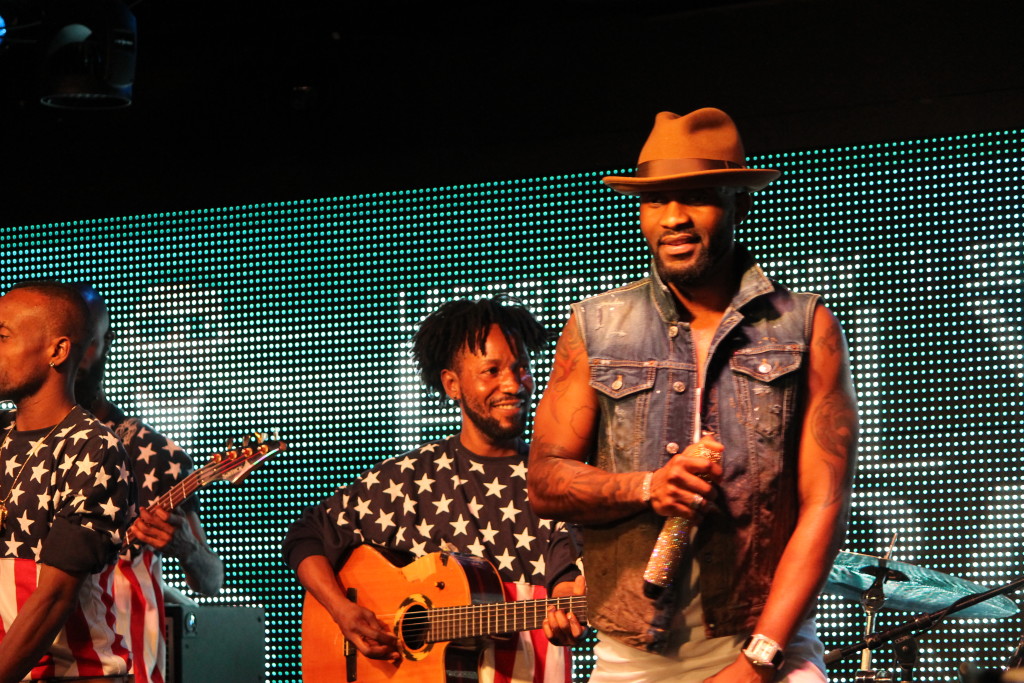 After the show, on the dark predawn streets of midtown Manhattan, it was hard to believe that the hottest Congolese and Ivorian artists had just brought a bit of their powerful swagger to NYC. But the persistent ringing in my ears attested to the powerful sound and spectacle I had just witnessed. Fally had been scheduled to perform at least twice in New York in the past few years, but each time the show was canceled just weeks before. I felt honored to have witnessed this star in action.
All photos by Lollise Mbi. Thanks to Isaac Nkumu Katalay for greasing the wheels of promotional hierarchy to get us press access to the show.
After the show, on the dark predawn streets of midtown Manhattan, it was hard to believe that the hottest Congolese and Ivorian artists had just brought a bit of their powerful swagger to NYC. But the persistent ringing in my ears attested to the powerful sound and spectacle I had just witnessed. Fally had been scheduled to perform at least twice in New York in the past few years, but each time the show was canceled just weeks before. I felt honored to have witnessed this star in action.
All photos by Lollise Mbi. Thanks to Isaac Nkumu Katalay for greasing the wheels of promotional hierarchy to get us press access to the show.
 Suddenly he was on stage, striding out amidst a burst of light from the screens and a wilder burst of sound from the speakers. He was followed by his famous dancer Zota, dressed in a white tank-top and loose gym pants with close-cropped blonde hair and a gold chain around her neck. The backing tracks blared through the speakers, distorting with the extreme volumes. It was immediately clear why Beynaud brought Zota to perform with him. She danced with the focus and intention of an boxer, eyes fixed straight ahead, legs working non-stop, upper body dipping and dodging.
Suddenly he was on stage, striding out amidst a burst of light from the screens and a wilder burst of sound from the speakers. He was followed by his famous dancer Zota, dressed in a white tank-top and loose gym pants with close-cropped blonde hair and a gold chain around her neck. The backing tracks blared through the speakers, distorting with the extreme volumes. It was immediately clear why Beynaud brought Zota to perform with him. She danced with the focus and intention of an boxer, eyes fixed straight ahead, legs working non-stop, upper body dipping and dodging.
 Beynaud sang along to the hyper coupé decalé tracks, eyes hidden behind shades, gold chain swinging from his neck.
Beynaud sang along to the hyper coupé decalé tracks, eyes hidden behind shades, gold chain swinging from his neck.
 The crowd sang along to his hit, "Kababléké," snapping videos and photos with their phones. When he danced, he easily matched Zota in energy and attack, but gave her the credit. "Who loves Zota?!" The crowd screamed.
The crowd sang along to his hit, "Kababléké," snapping videos and photos with their phones. When he danced, he easily matched Zota in energy and attack, but gave her the credit. "Who loves Zota?!" The crowd screamed.
 After a quick fiery set, Beynaud and Zota left the stage. The tension mounted...
"Ladies and gentlemen, Africans! C'est parti! Give them a round of applause!" The moment we had all been waiting for arrived: 10 men took the stage, dressed in identical American flag T-shirts. They quickly set levels on amps, and settled behind drum set and congas. The crowd screamed as the band kicked into unison hits. The crowd screamed even louder as the four backup singers approached the mic to sing the chorus of a slow rumba. The crowd let out a deafening roar as the star himself, Fally Ipupa, strode onstage in a denim vest, hat and sunglasses, holding a gold-plated microphone and began to sing in sweet tones through the distorted sound system.
After a quick fiery set, Beynaud and Zota left the stage. The tension mounted...
"Ladies and gentlemen, Africans! C'est parti! Give them a round of applause!" The moment we had all been waiting for arrived: 10 men took the stage, dressed in identical American flag T-shirts. They quickly set levels on amps, and settled behind drum set and congas. The crowd screamed as the band kicked into unison hits. The crowd screamed even louder as the four backup singers approached the mic to sing the chorus of a slow rumba. The crowd let out a deafening roar as the star himself, Fally Ipupa, strode onstage in a denim vest, hat and sunglasses, holding a gold-plated microphone and began to sing in sweet tones through the distorted sound system.
 The high-pitched feedback whistled across the stage as the soundman struggled to balance all the wireless mics pushed to maximum volume. The volume and distortion made the experience more extreme: The packed dance floor was surrounded by walls of sound pushing from surrounding speakers; the floor felt like a boxing ring, and we were being beaten into sweet submission by a very worthy opponent.
The high-pitched feedback whistled across the stage as the soundman struggled to balance all the wireless mics pushed to maximum volume. The volume and distortion made the experience more extreme: The packed dance floor was surrounded by walls of sound pushing from surrounding speakers; the floor felt like a boxing ring, and we were being beaten into sweet submission by a very worthy opponent.
 The band tore through tight, aggressive grooves, quickly switching rhythms, dropping from a fast 6/8 to a chill rumba, then launching into a waist-twisting ndombolo. When the first seben dance section hit, the three guitars emerged from the mix, each swaggering in their own register, and the drummer and bassist pushed the exciting feeling forward. The singer on the far left, the atalaku or animateur, began to shout/sing as the other singers danced together, turned lightly, arms raised.
The band tore through tight, aggressive grooves, quickly switching rhythms, dropping from a fast 6/8 to a chill rumba, then launching into a waist-twisting ndombolo. When the first seben dance section hit, the three guitars emerged from the mix, each swaggering in their own register, and the drummer and bassist pushed the exciting feeling forward. The singer on the far left, the atalaku or animateur, began to shout/sing as the other singers danced together, turned lightly, arms raised.
 When Fally sang his hit slow-jam r&b rumba "Sweet Life (La Vie Est Belle)," he took off his vest (greeted by screams of delight) and invited four very excited young women to join him on stage as he crooned in English, French and Lingala.
When Fally sang his hit slow-jam r&b rumba "Sweet Life (La Vie Est Belle)," he took off his vest (greeted by screams of delight) and invited four very excited young women to join him on stage as he crooned in English, French and Lingala.
 The winning formula was clear: a chill, sexy rumba was immediately followed with a crushing, tight dance tune, then, after 10 joyful minutes of serious, heavy music and dance, they played another rumba as a palate cleanser. Fally and his band crushed us into joyful submission again and again as the night waned into early morning of Labor Day Monday. Dance circles of young men and women formed in the back of the hall. The band played a destructive, aggressive version of the 2014 hit, "Hustler Is Back," which transitioned into a long seben with dance solos for all the backup singers and scantily clad dancers who appeared from the wings.
The winning formula was clear: a chill, sexy rumba was immediately followed with a crushing, tight dance tune, then, after 10 joyful minutes of serious, heavy music and dance, they played another rumba as a palate cleanser. Fally and his band crushed us into joyful submission again and again as the night waned into early morning of Labor Day Monday. Dance circles of young men and women formed in the back of the hall. The band played a destructive, aggressive version of the 2014 hit, "Hustler Is Back," which transitioned into a long seben with dance solos for all the backup singers and scantily clad dancers who appeared from the wings.
 After the show, on the dark predawn streets of midtown Manhattan, it was hard to believe that the hottest Congolese and Ivorian artists had just brought a bit of their powerful swagger to NYC. But the persistent ringing in my ears attested to the powerful sound and spectacle I had just witnessed. Fally had been scheduled to perform at least twice in New York in the past few years, but each time the show was canceled just weeks before. I felt honored to have witnessed this star in action.
All photos by Lollise Mbi. Thanks to Isaac Nkumu Katalay for greasing the wheels of promotional hierarchy to get us press access to the show.
After the show, on the dark predawn streets of midtown Manhattan, it was hard to believe that the hottest Congolese and Ivorian artists had just brought a bit of their powerful swagger to NYC. But the persistent ringing in my ears attested to the powerful sound and spectacle I had just witnessed. Fally had been scheduled to perform at least twice in New York in the past few years, but each time the show was canceled just weeks before. I felt honored to have witnessed this star in action.
All photos by Lollise Mbi. Thanks to Isaac Nkumu Katalay for greasing the wheels of promotional hierarchy to get us press access to the show.








